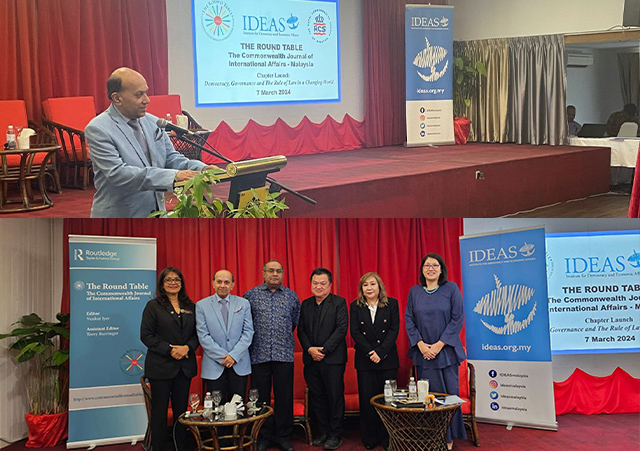 [top] Venkat Iyer at the podium. [Bottom l-r] Bernice Narayanan, Venkat Iyer, Terence Gomez, Wong Chin-Huat, Karen Cheah and Tricia Yeoh.
[top] Venkat Iyer at the podium. [Bottom l-r] Bernice Narayanan, Venkat Iyer, Terence Gomez, Wong Chin-Huat, Karen Cheah and Tricia Yeoh.
On 8 March 2024, a Chapter of the Round Table was inaugurated in Malaysia, expanding the number of such Chapters to five (previous ones are based in Australia, Bangladesh, India and Sri Lanka). These Chapters are aimed at promoting the organisation and its flagship journal, The Round Table: The Commonwealth Journal of International Affairs, and constitute an informal grouping of friends and supporters of the Round Table.
The Malaysian launch was co-hosted by two local institutions, the Institute of Democracy and Economic Affairs (IDEAS) and the Royal Commonwealth Society of Malaysia (RCS-M). It was held in the Tun H.S. Lee Room of the RCS-M’s headquarters in Bukit Damansara, Kuala Lumpur, and attended by a host of dignitaries.
In addition to speeches by Dr Tricia Yeoh (CEO of IDEAS), Dr Venkat Iyer (Editor,The Round Table) and Ms Bernice Narayanan (Chair of RCS-M), and a keynote address by Professor Shad Saleem Faruqi (who holds the Tunku Abdul Rahman Chair at the University of Malaya), the event included a panel discussion on the theme of “Democracy, Governance and the Rule of Law in a Changing World”. Speakers on the panel included: Professor Wong Chin Huat (Deputy Head, UN Sustainable Solutions Network – Asia Headquarters, Sunway University), Dr Terence Gomez (former Professor of Political Economy, University of Malaya) and Ms Karen Cheah (President, Bar Council of Malaysia).
Although the keynote speech and panel discussion had a sharp focus on developments in Malaysia, they also carried reflections of a broader nature touching upon the importance of good governance and the rule of law. Prof Faruqi noted, among other things, that global freedom, as reported in published indices, declined for the 18th consecutive year since 2023, and that a number of factors – including wars, violations of human rights and humanitarian laws, assaults on pluralism, and abuses of power by politicians – were responsible for that disappointing reality. “Life, liberty and property,” noted the professor, “cannot be protected, human dignity cannot be promoted and security of expectations cannot be guaranteed unless the conditions that promote wars, racial or religious riots and internecine conflicts are removed.”
Find out more about The Round Table Journal
All the speakers identified a number of deficiencies in the matter of good governance in Malaysia itself in recent years. Although the country had done reasonably well in containing major racial, religious and regional conflicts, they observed that strains were visible in the social fabric arising from the rise of extremist and fringe groups which, they said, needed to be dealt with.
Issues of national identity and the management of differences between the communities that constitute Malaysia’s multicultural population featured prominently in the discussion. Reference was made to the ‘social contract’ which underlay the post-independence constitutional settlement and which, it was suggested, was coming under threat.
At another level, Karen Cheah pointed out that many proposals from organisations like the Bar Council for legislative reforms – aimed at improving the quality of governance overall – have not received the necessary attention from successive governments. This, said Ms Cheah, was hugely disappointing and frustrating.
June 2023 special journal edition on Malaysia
Prof Wong drew attention to the increasing influence that extremist politicians were having on democracy in Malaysia. He advocated a coming together, in the larger national interest, of the more mainstream parties to the centre ground so that the extremists were marginalised and, in the long term, banished from electoral politics. Whether that was likely to happen became the subject of much animated discussion in the question and answer session that followed.
Dr Gomez’s contribution to the panel discussion revolved around issues of transparency and the control of corruption. Citing extensive statistics that he had complied over many years of research as one of Malaysia’s leading experts on the subject, he demonstrated that the ethnic-based policies of various governments had led to the enriching of politicians at the expense of those whom the policies were intended to benefit. He was particularly critical of the political manipulation of government-linked companies and the ravages that such manipulation had wreaked within Malaysian society.
The panel discussion, moderated by Dr Yeoh, elicited an enthusiastic response from the assembled audience who were drawn from academia, politics, the business community and other sectors. The Editor of The Round Table, Dr Iyer, in his opening speech explained the history and scope of the journal and encouraged those present to consider writing for it. The event concluded with further informal discussions between those present over tea and refreshments.
Venkat Iyer is the Editor of The Round Table Journal.
Related articles:
India Round Table Chapter discuss ‘Brexit: What Next’



